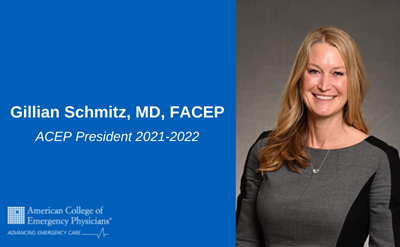WASHINGTON, D.C.—During National Suicide Awareness Week, emergency physicians encourage helping those in crisis by recognizing some of the signs that could lead anyone to consider suicide.
“Emergency physicians see many people who are struggling silently with their mental health,” said Gillian Schmitz, MD, FACEP, president of ACEP. “One of the most impactful things anyone can do to prevent a tragedy is to spot signs of trouble and simply start a conversation. Talking about mental health is an important first step that could make all the difference for somebody who needs help.”
There are certain characteristics that can make it more likely someone could consider suicide. Risk factors include certain mood or personality disorders, alcohol or substance use disorders, feelings of hopelessness, aggressive or impulsive behaviors, a history of trauma, major illness, previous suicide attempts or family history of suicide, job loss, a lack of social support, or lack of access to health care or behavioral health services.
There was one death by suicide every 11 minutes in the United States in 2020, according to the Substance Abuse and Mental Health Services Administration (SAMHSA). People at risk often demonstrate one or more warning signs. If there is an immediate health or safety risk, call 911 or go to the nearest emergency department. Warning signs can include:
- Talking about wanting to die, feeling hopeless, or being a burden
- Increasing the use of alcohol or drugs
- Engaging in reckless or risky behaviors
- Having trouble sleeping or sleep all the time
- Suddenly withdrawing or isolating from family or friends
- Displaying extreme mood swings, rage, or revenge-seeking behaviors
- Experiencing unusual amounts of anxiety or agitation
Emergency physicians are critical partners in identifying and treating those at the most immediate risk of suicide. In fact, 39% of people who die by suicide visit the emergency department in the year prior to their death, according to the American Foundation for Suicide Prevention.
“One of the most effective ways to prevent suicide is to prioritize and address mental health before it becomes an emergency,” said Dr. Schmitz. “But you can be assured that an emergency physician will be ready to help if a crisis occurs.”
Anyone in suicidal crisis or experiencing mental health-related distress can get help through the new 988 Lifeline, formerly known as the National Suicide Prevention Lifeline, a network of more than 200 locally operated and funded crisis centers around the country. The 988 Lifeline provides free and confidential support to people 24 hours a day, 7 days a week, across the country. People can call or text 988, or chat (988lifeline.org) for themselves or if they are worried about a loved one who may need crisis support.
 American College of Emergency Physicians
American College of Emergency Physicians







